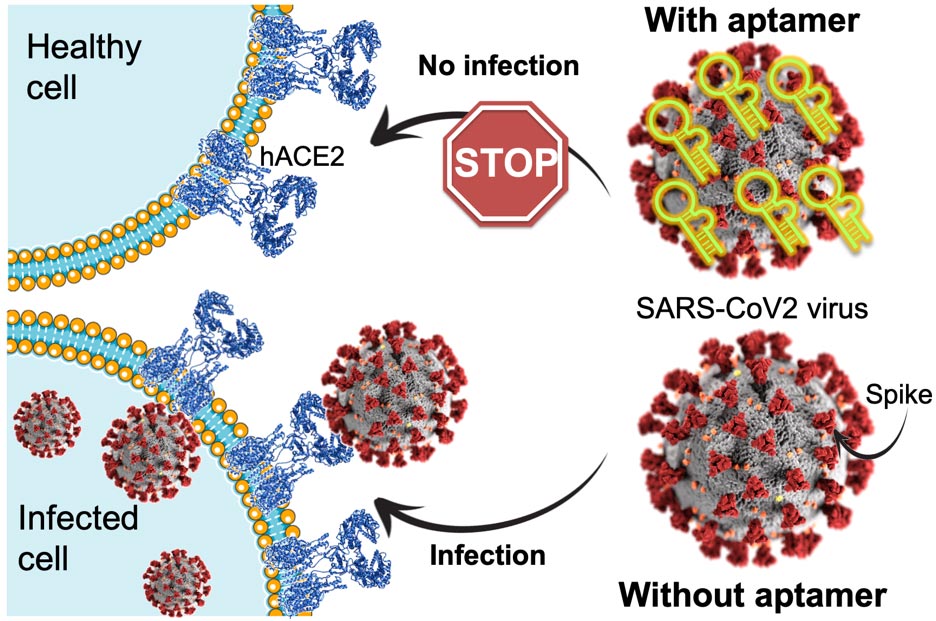Scientists Develop a New Molecule That Blocks COVID-19 Infection
0 View
Share this Video
- Publish Date:
- 14 December, 2021
- Category:
- Covid
- Video License
- Standard License
- Imported From:
- Youtube
Tags

The Spike protein on the surface of the SARS-CoV-2 virus (marked red) recognizes the hACE2 protein (marked blue) that protrudes from healthy human cells in the throat and lungs. In this way, the Spike protein acts as a key that allows the virus to enter the cell and use its machinery to reproduce itself. The newly developed RNA aptamer (highlighted in yellow) binds the Spike protein very strongly and blocks its ability to recognize ACE2, preventing further infection. Credit: Julián Valero, University of Aarhus
A research team from Aarhus University has developed a new molecule that attaches to the surface of SARS-CoV-2 virus particles. This attachment prevents the virus from entering human cells and spreading the infection.
The newly developed molecule belongs to a class of compounds known as RNA aptamers and is based on the same type of building blocks used for mRNA vaccines. This makes them much cheaper and easier to produce than the antibodies currently used to treat Covid-19 and to detect viral infection using rapid antigen testing.
An aptamer is a piece of DNA or RNA that folds into a 3D structure that can recognize a specific target molecule of interest. By attaching to the virus surface, the RNA aptamer prevents the Spike protein from serving as a key that allows the virus to enter a cell.
Therefore, the RNA aptamer is not a new type of vaccine, but a compound that could potentially prevent the virus from spreading in the body once someone has been exposed to the virus.
The efficient binding to the SARS-CoV-2 virus also means that the aptamer can be used to test for Covid-19 infection.
“We have started testing the new aptamer in rapid tests and we expect to be able to detect very low concentrations of the virus,” said Professor Jørgen Kjems from Aarhus University, the lead author of the paper just published in the prestigious magazine, PNAS.
Research in cell culture shows that the aptamer works against the earlier variants of the coronavirus that the researchers were allowed to test.
“Since we submitted the article for peer review, we have continued our studies and can show that it also recognizes the delta variant. Now we are waiting for samples of the newly identified variant, omicron, so that we can test whether the aptamer recognizes it too,” says Jørgen Kjems.
He emphasizes that the results with the delta variant have not yet been peer-reviewed and published.
Reference: “A serum stable RNA aptamer specific for SARS-CoV-2 neutralizes viral entry” by Julián Valero, Laia Civit, Daniel M. Dupont, Denis Selnihhin, Line S. Reinert, Manja Idorn, Brett A. Israels, Aleksandra M Bednarz Claus Bus, Benedikt Asbach, David Peterhoff, Finn S. Pedersen, Victoria Birkedal, Ralf Wagner, Søren R. Paludan, and Jørgen Kjems, December 7, 2021, Proceedings of the National Academy of Sciences.
DOI: 10.1073/pnas.2112942118
Funding: Carlsberg Foundation, Danish National Research Foundation, EU Horizon2020










